This started out as a small post of a reader comment and turned into a much more ambitious one about domestic savings in China (typically Tuesday afternoon fair). First, some comments on RMB devaluation from China's central bank, next a possible dollar-bullish implication on revaluation of the RMB (bear with my madness), and last, the aforementioned reader comment.
First, it IS true that the Remnibi floats within a "band" and that it IS possible to have a "managed floating exchange rate." According to a February analysis by the Bank of China group which you can find
here, "The trading band has been set at 8.2760-8.2800 or a wafer-thin 0.02% up or down since April 2000."
Thus, in theory, China could gradually widen the band...and revalue the RMB slowly. Practically speaking, I'd expect that each time the band is widened, traders will push the currency to the lower end (a stronger currency). This is sort of like managed free fall. Instead of allowing the elevator to plummet from the 8th floor to the first, it patiently stops at each floor in between.
But even that may not completely happen, if you listen to Chinese bankers. They make the quite obvious point that internally, allowing the RMB to float doesn't make sense. They add these few choice statements:
"
A country's foreign exchange policy is designed to serve its own interest...The free convertibility of the RMB and the complete opening of the capital account are the ultimate prize of China's reform. Although an RMB revaluation is favorable to reducing import cost, facilitating overseas expansion and reducing foreign debt, it may not benefit the overall economy. Besides, it is not the most urgent task for China to undertake and China should stay clear from fighting on different fronts. Instead, China should concentrate its resources to tackle the urgent problems facing the economy, namely maintaining high growth while forestalling any bubbles, further stimulating domestic demand to combat deflation, and expediting and deepening financial reforms."
In other words, kiss off John Snow (even though these comments were made in February.) The interesting question is what the report means by "deepening financial reforms." More on that in a moment.
It's obvious the Chinese know what the Americans know. They are on to the ruse that a weaker dollar improves American competitiveness. It surely does not.
American exports to China may get relatively cheaper thanks to a weaker currency. But for the most part, for nearly any industry, the largest single contributor to the total cost of production is labor. I'm sure I could verify this with a little more research. But this is blogging, so you'll have to content yourself with a straw poll from the Paris office.
We could only come up with two businesses, maybe three, where labor was the not the largest factor in the cost of production. Bill figured that in jewelry, the cost of the raw materials (gold are precious gems) was probably larger than the cost of labor. And Fanny and Francoise figured that in a French restaurant, you're paying as much in taxes as you are for labor.
In a very unscientific example, we figured that on a check of 10 euros, you paid 2 in VAT, 2 for good, and 6 for the server. But because the server is taxed at a high rate, he only takes home roughly 4 of the euros you pay him. The other two are tax. So in the end, you're paying 4 euros in tax, four for the server, and 2 for the food. If you can think of other exceptions, by all means let me know.
But it's quite obvious that when it comes to manufactured goods, the Chinese advantage on labor costs cannot be nullified through a lower dollar. Just take a look at the chart below, which shows hourly labor costs in manufacturing for Asian nations and the U.S. (interesting question how much U.S. manufacturing wages are influenced by collective bargaining...and certainly, I'm not arguing that Americans would be
better off making Chinese wages...only that American manufacturing, all things remaining equal, can't compete.)
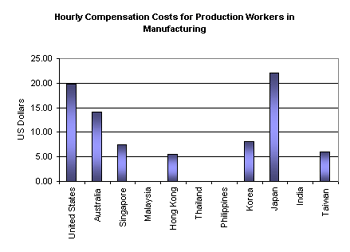
The revaluation argument doesn't hold water with respect to improving American exports to China. But IT does have huge implications for China's pool of domestic savings and how capital is allocated within the country. And this gets to the heart of exactly what impact a revaluation would have on the dollar.
The chart below shows domestic savings rates in Asia. What's notable about China's figure is not that it's high, like figures for other Asian countries.
What's notable about it is that China's high domestic savings rate makes a large pool of capital available to the government for investment. In fact, until foreign direct investment began to grow, the pool of domestic savings is how the Chinese financed the huge growth in production capacity.
What Will the Chinese do With Their Savings?
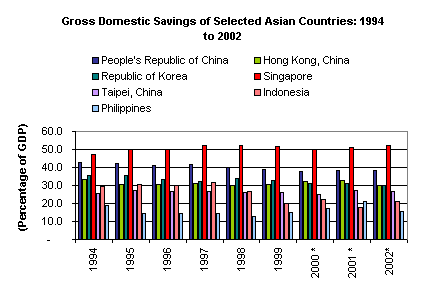
A critical question for the value of the Chinese currency after it "floats" is whether or not there will be any change to existing restrictions on domestic capital.
In other words, if floating the currency is accompanied by a broad liberalizing of capital restrictions in China...what will happen?
Will Chinese savers decide to spend more? Will they covert their RMB savings to gold? Or will they, gasp, choose dollars? It's possible that liberated from the forced confiscation of their savings by the government...your average Chinese saver will move into dollars.
This is really a question I can't answer from my desk in Paris. I have no idea if your average Chinese saver would convert is savings into gold or dollars, if given the chance.
We do know, generally, a preference for gold in Asia. What we don't have, at least I don't have, is local knowledge. Do Chinese savers know something about the overall health of their economy...something we don't know...and something that would cause them to get outside of their currency post haste?
That's a possibility. The same way Asian central banks have shown a propensity for owning dollar-denominated U.S. bonds...perhaps rank and file Asian savers want to own pretty new $20 bills backed by the U.S. government. Stranger things have happened.
And now...the reader comment...
Technically,China doesn't rigidly peg the renmimbi to the us dollar. There is actually a very tight 40-pip band - 8.2760 - 8.2800 within which China keeps the currency trading versus the dollar.
Now I realize it's a bit of a niggle to even bring such a thing up, but I do believe it explains the comment by Wen, which really said nothing at all. When China does something about the CNY, it will take the form of 'widening the band', say to 2.5%, which would alter the band from 8.2760 - 8.2800 to 8.0710 - 8.4850.
At which point conventional wisdom suggests the market will force CNY to 8.0710, and there it will sit. Recently, a prominent Chinese bureaucrat suggested the CNY may actually DEvalue upon widening the band, based on pent-up domestic demand for dollar savings. He (I don't recall the name) cited Taiwan and Hong Kong, where about half of savings are denominated in dollars, as examples that Asians have a cultural preference for hard savings (whether the dollar represents hard savings any more is yet another issue entirely).
Given that it was a contrarian argument, and I am a contrarian, it interested me... yet I can't buy it. If the Chinese government believed that hogwash, they would have floated the currency, or at least widened the band by now. What I expect is a near term widening of the band - something Goldman Sachs has been calling for for quite some time - by something between 2 and 5% (the NDF market is pricing close to 5%).
Why? The recent G7 meeting has thus far resulted in a 5+% revaluation of other Asian currencies. The main reason China resists revaluation is a desire to maintain competitive supremacy over its Asian counterparts in the battle for the American consumer. With all other Asian currencies strengthened, China can now act the hero. My bet is there was a backdoor agreement between the G7, China, and other-Asia that Asian currencies would be marked up in an orderly fashion, and that China, once satisfied that this policy was a success, would then revalue the CNY ON ITS OWN TERMS. It's very important - a cultural requirement, even - to the Chinese government that China not be seen to bow to Western pressures.
This is why we've seen the pressure diverted almost entirely to Japan in the political rhetoric emanating from Washington since the G7 meeting. It's been accepted that China will not act while there is visible pressure to do so. They will act of their own accord, or at least only when the case can be made that the move is not in response to pressure.
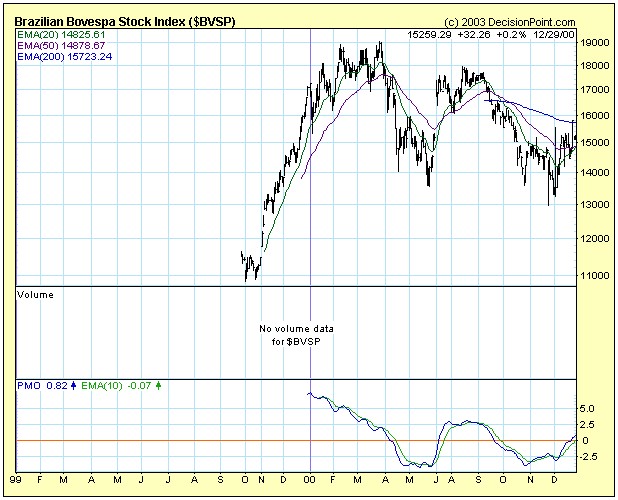
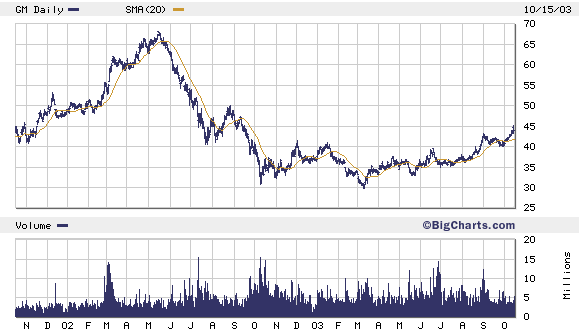
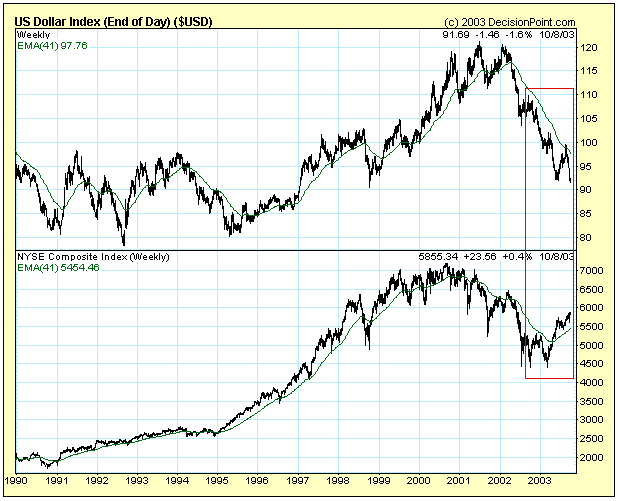
 The revaluation argument doesn't hold water with respect to improving American exports to China. But IT does have huge implications for China's pool of domestic savings and how capital is allocated within the country. And this gets to the heart of exactly what impact a revaluation would have on the dollar.
The chart below shows domestic savings rates in Asia. What's notable about China's figure is not that it's high, like figures for other Asian countries. What's notable about it is that China's high domestic savings rate makes a large pool of capital available to the government for investment. In fact, until foreign direct investment began to grow, the pool of domestic savings is how the Chinese financed the huge growth in production capacity.
What Will the Chinese do With Their Savings?
The revaluation argument doesn't hold water with respect to improving American exports to China. But IT does have huge implications for China's pool of domestic savings and how capital is allocated within the country. And this gets to the heart of exactly what impact a revaluation would have on the dollar.
The chart below shows domestic savings rates in Asia. What's notable about China's figure is not that it's high, like figures for other Asian countries. What's notable about it is that China's high domestic savings rate makes a large pool of capital available to the government for investment. In fact, until foreign direct investment began to grow, the pool of domestic savings is how the Chinese financed the huge growth in production capacity.
What Will the Chinese do With Their Savings?
 A critical question for the value of the Chinese currency after it "floats" is whether or not there will be any change to existing restrictions on domestic capital. In other words, if floating the currency is accompanied by a broad liberalizing of capital restrictions in China...what will happen?
Will Chinese savers decide to spend more? Will they covert their RMB savings to gold? Or will they, gasp, choose dollars? It's possible that liberated from the forced confiscation of their savings by the government...your average Chinese saver will move into dollars.
This is really a question I can't answer from my desk in Paris. I have no idea if your average Chinese saver would convert is savings into gold or dollars, if given the chance. We do know, generally, a preference for gold in Asia. What we don't have, at least I don't have, is local knowledge. Do Chinese savers know something about the overall health of their economy...something we don't know...and something that would cause them to get outside of their currency post haste?
That's a possibility. The same way Asian central banks have shown a propensity for owning dollar-denominated U.S. bonds...perhaps rank and file Asian savers want to own pretty new $20 bills backed by the U.S. government. Stranger things have happened.
And now...the reader comment...
Technically,China doesn't rigidly peg the renmimbi to the us dollar. There is actually a very tight 40-pip band - 8.2760 - 8.2800 within which China keeps the currency trading versus the dollar.
Now I realize it's a bit of a niggle to even bring such a thing up, but I do believe it explains the comment by Wen, which really said nothing at all. When China does something about the CNY, it will take the form of 'widening the band', say to 2.5%, which would alter the band from 8.2760 - 8.2800 to 8.0710 - 8.4850.
At which point conventional wisdom suggests the market will force CNY to 8.0710, and there it will sit. Recently, a prominent Chinese bureaucrat suggested the CNY may actually DEvalue upon widening the band, based on pent-up domestic demand for dollar savings. He (I don't recall the name) cited Taiwan and Hong Kong, where about half of savings are denominated in dollars, as examples that Asians have a cultural preference for hard savings (whether the dollar represents hard savings any more is yet another issue entirely).
Given that it was a contrarian argument, and I am a contrarian, it interested me... yet I can't buy it. If the Chinese government believed that hogwash, they would have floated the currency, or at least widened the band by now. What I expect is a near term widening of the band - something Goldman Sachs has been calling for for quite some time - by something between 2 and 5% (the NDF market is pricing close to 5%).
Why? The recent G7 meeting has thus far resulted in a 5+% revaluation of other Asian currencies. The main reason China resists revaluation is a desire to maintain competitive supremacy over its Asian counterparts in the battle for the American consumer. With all other Asian currencies strengthened, China can now act the hero. My bet is there was a backdoor agreement between the G7, China, and other-Asia that Asian currencies would be marked up in an orderly fashion, and that China, once satisfied that this policy was a success, would then revalue the CNY ON ITS OWN TERMS. It's very important - a cultural requirement, even - to the Chinese government that China not be seen to bow to Western pressures.
This is why we've seen the pressure diverted almost entirely to Japan in the political rhetoric emanating from Washington since the G7 meeting. It's been accepted that China will not act while there is visible pressure to do so. They will act of their own accord, or at least only when the case can be made that the move is not in response to pressure.
A critical question for the value of the Chinese currency after it "floats" is whether or not there will be any change to existing restrictions on domestic capital. In other words, if floating the currency is accompanied by a broad liberalizing of capital restrictions in China...what will happen?
Will Chinese savers decide to spend more? Will they covert their RMB savings to gold? Or will they, gasp, choose dollars? It's possible that liberated from the forced confiscation of their savings by the government...your average Chinese saver will move into dollars.
This is really a question I can't answer from my desk in Paris. I have no idea if your average Chinese saver would convert is savings into gold or dollars, if given the chance. We do know, generally, a preference for gold in Asia. What we don't have, at least I don't have, is local knowledge. Do Chinese savers know something about the overall health of their economy...something we don't know...and something that would cause them to get outside of their currency post haste?
That's a possibility. The same way Asian central banks have shown a propensity for owning dollar-denominated U.S. bonds...perhaps rank and file Asian savers want to own pretty new $20 bills backed by the U.S. government. Stranger things have happened.
And now...the reader comment...
Technically,China doesn't rigidly peg the renmimbi to the us dollar. There is actually a very tight 40-pip band - 8.2760 - 8.2800 within which China keeps the currency trading versus the dollar.
Now I realize it's a bit of a niggle to even bring such a thing up, but I do believe it explains the comment by Wen, which really said nothing at all. When China does something about the CNY, it will take the form of 'widening the band', say to 2.5%, which would alter the band from 8.2760 - 8.2800 to 8.0710 - 8.4850.
At which point conventional wisdom suggests the market will force CNY to 8.0710, and there it will sit. Recently, a prominent Chinese bureaucrat suggested the CNY may actually DEvalue upon widening the band, based on pent-up domestic demand for dollar savings. He (I don't recall the name) cited Taiwan and Hong Kong, where about half of savings are denominated in dollars, as examples that Asians have a cultural preference for hard savings (whether the dollar represents hard savings any more is yet another issue entirely).
Given that it was a contrarian argument, and I am a contrarian, it interested me... yet I can't buy it. If the Chinese government believed that hogwash, they would have floated the currency, or at least widened the band by now. What I expect is a near term widening of the band - something Goldman Sachs has been calling for for quite some time - by something between 2 and 5% (the NDF market is pricing close to 5%).
Why? The recent G7 meeting has thus far resulted in a 5+% revaluation of other Asian currencies. The main reason China resists revaluation is a desire to maintain competitive supremacy over its Asian counterparts in the battle for the American consumer. With all other Asian currencies strengthened, China can now act the hero. My bet is there was a backdoor agreement between the G7, China, and other-Asia that Asian currencies would be marked up in an orderly fashion, and that China, once satisfied that this policy was a success, would then revalue the CNY ON ITS OWN TERMS. It's very important - a cultural requirement, even - to the Chinese government that China not be seen to bow to Western pressures.
This is why we've seen the pressure diverted almost entirely to Japan in the political rhetoric emanating from Washington since the G7 meeting. It's been accepted that China will not act while there is visible pressure to do so. They will act of their own accord, or at least only when the case can be made that the move is not in response to pressure.
